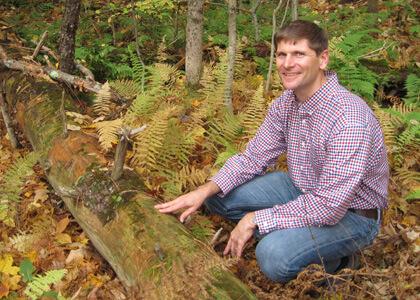Associate Professor Anthony D’Amato joins the Rubenstein School for the start of the spring 2015 semester. He brings an impressive portfolio of research, teaching, and collaboration in silviculture and applied forest ecology.
Previously on the faculty for seven years at the University of Minnesota in their Department of Forest Resources, Tony is happy to return to the Northeast where he grew up in Massachusetts. During his childhood summers, he developed his passion for forests and ecology in the woods of Vermont. His enthusiasm carried over to his undergraduate years as a forestry student at the University of Maine, and he is eager to share that passion with Rubenstein School students.
“I look forward to helping Rubenstein School undergraduates understand connections between forest ecology and the human side of forestry,” shares Tony. “I’m excited to help grow the forestry program, develop a stronger forestry presence in the School, reshape the forestry curriculum to appeal to more students, and work towards Society of American Foresters (SAF) accreditation with Bill Keeton and other forestry faculty in the Rubenstein School. I also look forward to collaborating with student forestry club advisor Justin Waskiewicz to build a strong student community outside the classroom.”
Tony also brings with him several of his many collaborative research projects. His research interests in silviculture and applied forest ecology aim to translate the principles of forest ecology into management strategies. He studies the effects of silvicultural practices on forests and the ecological services we derive from them. Research projects focus on long-term forest stand dynamics, forest management and natural disturbance effects on ecosystem structure and function, modeling forest growth and development, and assessing silvicultural strategies for adaptation to and mitigation from changing global conditions and societal objectives.
He is currently recruiting for both master’s and doctoral graduate students to join his laboratory and work on his research projects. He will continue working with colleagues at the University of Maine, the University of Minnesota, the University of Massachusetts, Harvard Forest, the USDA Forest Service Northern Research Station, and Northeast Climate Science Center.
Tony and his research partners are using dendrochronology and data from long-term silvicultural experiments to investigate silvicultural strategies for enhancing climate change adaptation and mitigation. They are also evaluating impacts of emerald ash borer on forest vegetation and hydrology and assessing silvicultural strategies for managing forests in the face of this threat. In conjunction with the Vermont Center for Ecostudies and Northeast Climate Science Center, Tony and his co-researchers are modeling effects of climate change on spruce-fir ecosystems using long-term vegetation and bird data to predict the future extent and condition of spruce-fir forests in northern New England and their bird populations.
“We are delighted to have Dr. D’Amato join the Rubenstein School,” acknowledges Dean Nancy Mathews. “He has built an internationally recognized research program that positions him as one of the foremost silviculturalists in the world. Tony has established himself as an expert in forest stand dynamics. He will add dramatic value to the school by establishing new collaborations to investigate the influence of climate change on forest productivity. He has also demonstrated a high capacity to fund his research, with over $9 million in extramurally funding in the last seven years. Having received several teaching awards at the University of Minnesota, we also look forward to him introducing teaching and learning innovations within the school.”
Tony will teach silviculture and possibly other courses in forest ecology, tree structure and function, forest measurements, or ecological statistics. With other Rubenstein School faculty, he will co-teach NR 6 Race and Culture in Natural Resources. At the graduate level, he hopes to teach a course in dendrochronology.
Tony has settled in Williston with his wife Jess Butler, an ecologist who works remotely for an environmental consulting firm in Minnesota, and their three-year-old son Quinn. They look forward to raising a family in rural Vermont and appreciate Vermont’s life style, local agriculture, and access to outdoor recreation. The family enjoys hiking and cross country skiing, and as an avid hockey fan, Tony is excited to follow UVM hockey.
